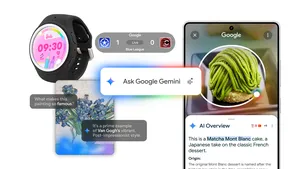4 ways Google Assistant helps me manage sensory overload

For some reason, it almost always happens when I’m putting away the groceries. Something about coming home from a crowded supermarket, changing environments and touching lots of textured, smelly foods sends my neurodivergent brain into sensory overload. Suddenly I’ll feel like I’ve stuck my head in the freezer along with the mushy peas — I become claustrophobic, frozen and overwhelmed by every sensation.
Sensory overload can be a common experience for me and other neurodivergent people, including those with Attention-deficit hyperactivity disorder (ADHD), Autism spectrum disorder (ASD), Post-traumatic stress disorder (PTSD) and Tourette’s, among others. And while I’m proud of my disability, life with sensory processing issues isn’t always easy — sometimes it feels like the world just wasn’t designed for people like me. That’s why I love my apartment. In my own space, I can use tools and technology, like Google Assistant, to set up accommodations that work for me, without any judgment.
Google Assistant Routines have been particularly helpful to me in managing my sensory overload. When you set up a Routine, you can trigger Google Assistant to automatically perform multiple actions at once. For me, this means that with just one command to my Google Assistant, I’m able to transform my room into a sensory-friendly space. I do that with a four-action custom Routine I created specifically to meet my needs — I call it “Zen Mode.” Here are the actions that happen whenever I activate my “Zen Mode” Routine, and why they’re helpful to me.
To set up a Routine, go to the Google Home app, open the Automations tab and then tap the plus sign. Give your Routine a name, then choose the actions and starters that would be most helpful to you. If speaking is difficult for you, you can also activate Routines in the Google Home app or using certain assistive technologies.

1. Action: Dim bedroom lights
One of my biggest triggers for sensory overload is harsh lighting. That’s why supermarket lights send me reeling, but it's also why I find myself in pain after staring at screens for too long or being hit by sudden, direct sunlight. With that in mind, the first action I added to my “Zen Mode” Routine was a command to dim and color the lights in my room to a soft blue hue.
2. Action: Play ambient noise
When I’m in overload, everything from a whisper to the sound of clinking dishes is amplified. I used to put in noise-canceling headphones to block everything out, but I’ve recently found that a gentle soundscape can help distract and soothe me. It took some experimenting, but I eventually decided on ocean sounds, which I can play from my Nest device. There are more than a dozen ambient noise options including white noise, a forest or a crackling fireplace.
3. Action: Make it warmer or cooler
Many neurodivergent folks struggle with heat intolerance or other temperature-related sensory processing issues. Personally, I'm always too hot or too cold, checking my thermostat almost as often as I check my phone. When I’m in sensory overload, I need it to be exactly 71 degrees — cold enough for my weighted blanket, but warm enough that I don’t get goosebumps. If you have a Nest thermostat, you can set a specific temperature into your Routine, so you can stay in your comfort zone.
4. Action: Send a text
Generally, when given the right accommodations, I can manage my sensory overload on my own, but that’s not always the case. Sometimes I need assistance from a loved one. That’s why every time I activate my “Zen Mode” Routine, I have it set to text my partner for awareness. That way, he knows to be aware of my overload and check in on me every now and then.
Sensory overload is different for everyone who experiences it. If you want to use Assistant for a similar purpose, it's important to tailor your Routines to your specific needs. Routines can be a convenient accommodation, but they don’t replace medical care, so it’s important to always have a backup plan in place. I encourage you to first do your research and speak to a healthcare professional about what may be helpful to you.
Being neurodivergent isn’t always easy. But I feel empowered knowing that even in a world that often feels inaccessible, I'm not alone, and there are tools to help me accommodate my needs without shame.





